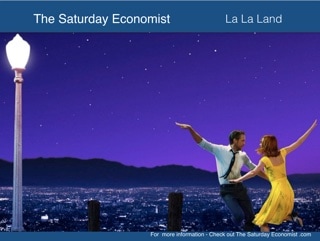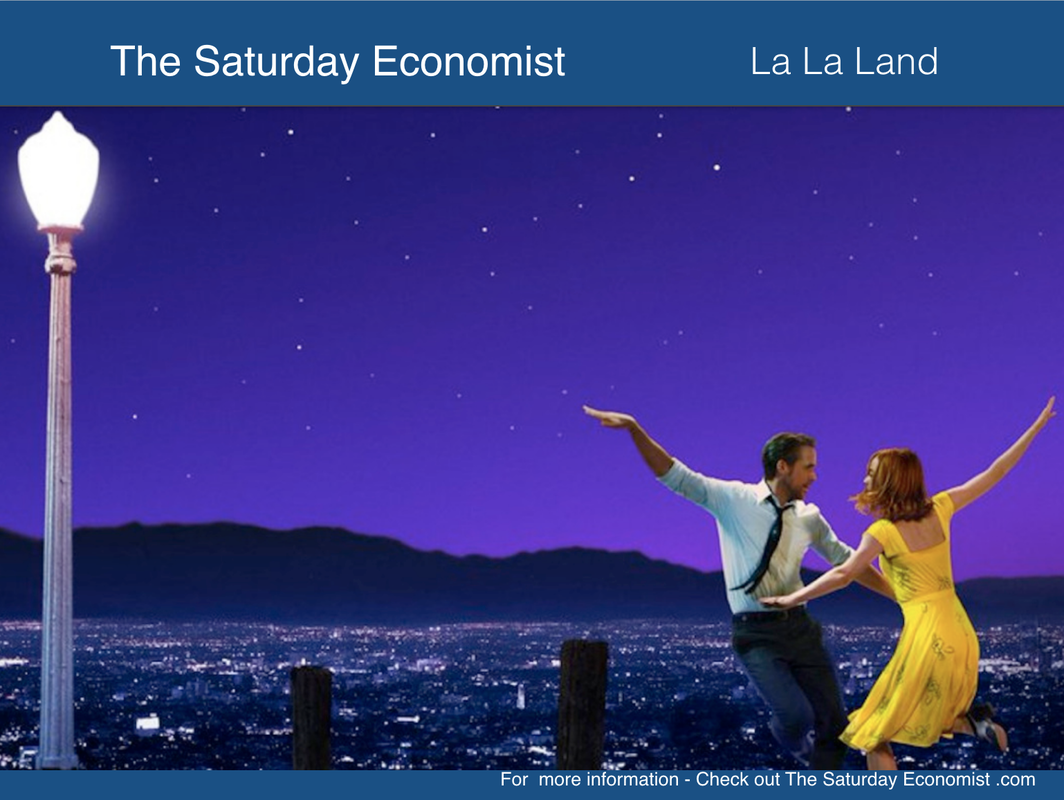 The week started well. Mary and I went to see La La Land. A great film. Two hours and eight minutes of abstraction from the real world of economics and business. A fitting theme for Davos perhaps, as world leaders were chastised ... out of touch with main stream hopes, desires and basic needs of ordinary people around the world. The La La Land theme continued into the week. The Governor of the Bank of England made a speech at LSE on Monday. Precipitous bank action in August had not only avoided a post Brexit crisis but saved 250,000 jobs in the process. Ah what assertions may be made in the absence of the counterfactual. The governor talked much of the Phillips curve. The relationship between unemployment and inflation. A model valid in a closed economy of yore, blown away by the absence of fixed exchange rates and commodity vacillations in a contemporary economy. Along with the J curve and the meandering NAIRU, the Phillips curve is just another "Lambda" to the slaughter or should be. By the end of the week, Trump was in the "White House" and Theresa May was in the "Dog House" of Europe having announced a "wish list" for negotiations. It was a list designed to appease the Tory right rather than a plausible start to the incredibly difficult task ahead. The ask includes, free trade, no customs union, no delaying douaniers, no contributions, no free movement of labour. "Come, if we can pick your brains or you can pick fruit" "Don't come if you can't speak English, sing Rule Brittania or have special needs". Our special needs include, passporting for finance, special deals for motor, aerospace and big pharma. We must have the freedom to be a "Beacon of Free Trade". Capturing new markets, first in line to do deals with the U.S, (putting "America First"). The message to Europe ... deal with us or we will take or Airbus wings elsewhere! Deal with us or we will become a tax haven. We will morph into the Singapore of Europe, albeit without High Speed Broadband. The danger is we become, not a "beacon of free trade" around the world but a "distress signal" fired from a small island off the coast of Europe! Replacing 46% of UK exports won't be easy or quick! The average trade deal takes seven years. Deals with twenty countries - that's almost one hundred and fifty years of bartering ahead! But first we must trigger article 50, then deal with the sordid topic of coin, the near €60 billion cost of separation! Economic news this week ... Inflation set to spike! Inflation increased to 1.6% CPI basis in September up from 1.2% prior month. Inflation will spike in the next three months. The headline rate could double to over 3% in the quarter, just in time for the annual pay round. Goods inflation increased to 0.7% but price pressures are building as a result of oil price rises. At current prices and exchange rates oil prices will be near 90% up over the quarter in sterling terms. Producer input costs increased by 16% in the month. Producer output prices were up by 2.3%. Earnings increased by 2.8% in the latest date to November. Private sector incomes increased by over 3%. Construction earnings increased by 6%. The UK faces an inflationary surge in the first quarter which may force the Bank of England into action. The Governor suggested the next move in base rates could be up or down. Really? US inflation increased to 2.1% in December prompting Janet Yellen to confirm the path of US rates in 2017 is up! The Bank may be forced much earlier than expected. Economic news this week .. full employment looms! Jobs data this week suggest the U.K is nearing full employment with little change in the data month on month. In November, the number of people unemployed was 1.6 million, the rate unchanged at 4.8%. In our forecasts for 2017 we expect the unemployment rate to average 4.8% through the year. The claimant count was just under 800,000 broadly in line with the number of vacancies. The unemployment rate was 2.3%. Lower than pre recession levels in 2008. Conventional theory identifies, three main sectors of unemployment. Cyclical, structural and frictional. In the UK, cyclical unemployment is at a high, structural "u" continues as always along with "frictional" unemployment. As markets near full employment, the short term vacillations become more prevalent. This should not be confused with a structural slowdown. Earnings are rising despite the public sector pay repression. We expect prices to spike in Q1, putting pressure on wage negotiations in the upcoming pay round. Inflation spiking, earnings rising, full employment looming, a trade deficit increasing and base rates at 0.25%? Someone somewhere really is living in La La Land. So what happened to Markets? Markets, were off the Dow closed at 19,806 from 19,881. The FTSE closed at 7,198 from 7,337. Sterling was up against the Dollar to $1.234 from $1.219 and up against the Euro to €1.155 from €1.147. The Euro moved up against the Dollar at 1.067 from 1.063. Oil Price Brent Crude closed at $55.47 from $57.53 The average price in January last year was $37.00. UK Gilts - yields moved up. UK Ten year gilt yields closed at 1.43 from 1.37. US Treasury yields held at 2.50 from 2.42. Gold closed at $1,204 from $1,188. John That's all for this week. Don't miss the Business Conference in March. We focus on Digital Disruption and the Smart City Challenge. Our next economics presentation is on the 9th February in Manchester. © 2017 John Ashcroft, Economics, Strategy and Social Media, experience worth sharing. ______________________________________________________________________________________________________________ The material is based upon information which we consider to be reliable but we do not represent that it is accurate or complete and it should not be relied upon as such. We accept no liability for errors, or omissions of opinion or fact. In particular, no reliance should be placed on the comments on trends in financial markets. The receipt of this email should not be construed as the giving of advice relating to finance or investment.. ______________________________________________________________________________________________________________ If you do not wish to receive any further Saturday Economist updates, please unsubscribe using the buttons below or drop me an email at [email protected]. If you enjoy the content, why not forward to a friend, they can sign up here ... _______________________________________________________________________________________ For details of our Privacy Policy and our Terms and Conditions check out our main web site. John Ashcroft and Company.com _______________________________________________________________________________________________________________ Copyright © 2017 The Saturday Economist, All rights reserved. You are receiving this email as a member of the Saturday Economist Mailing List. You may have joined the list from Linkedin, Facebook Google+ or one of the related web sites. Our mailing address is: The Saturday Economist, Tower 12, Spinningfields,Manchester, Eng M3 3BZ, United Kingdom
0 Comments
Leave a Reply. |
The Saturday EconomistAuthorJohn Ashcroft publishes the Saturday Economist. Join the mailing list for updates on the UK and World Economy. Archives
July 2024
Categories
All
|
| The Saturday Economist |
The material is based upon information which we consider to be reliable but we do not represent that it is accurate or complete and it should not be relied upon as such. We accept no liability for errors, or omissions of opinion or fact. In particular, no reliance should be placed on the comments on trends in financial markets. The presentation should not be construed as the giving of investment advice.
|
The Saturday Economist, weekly updates on the UK economy.
Sign Up Now! Stay Up To Date! | Privacy Policy | Terms and Conditions | |

 RSS Feed
RSS Feed